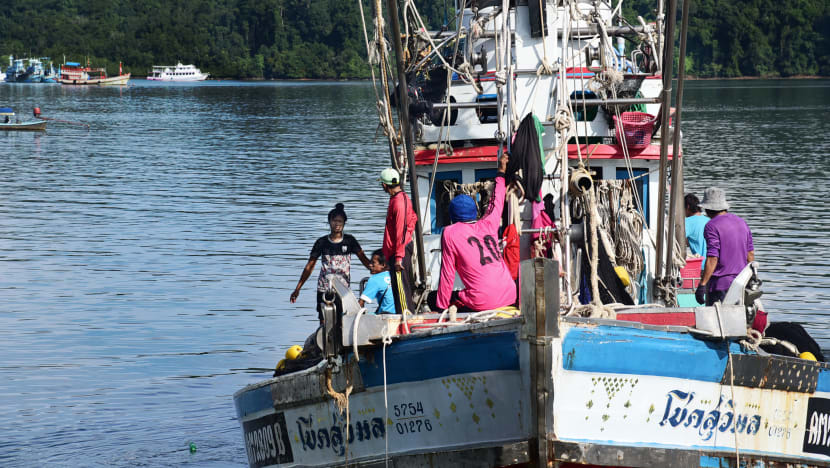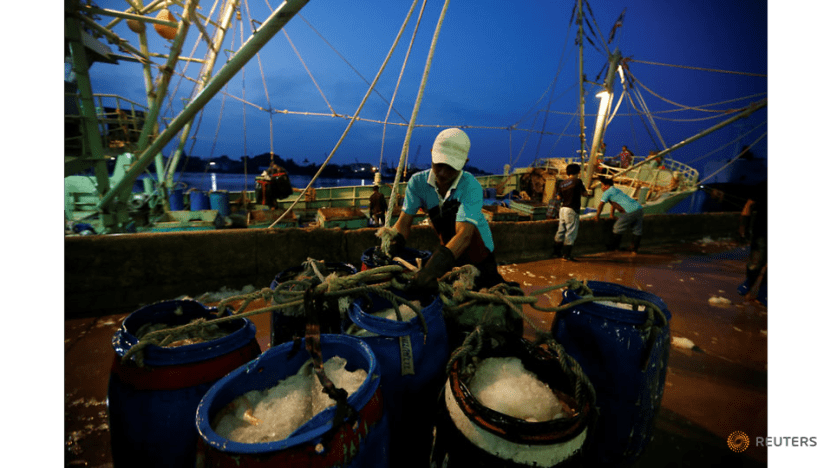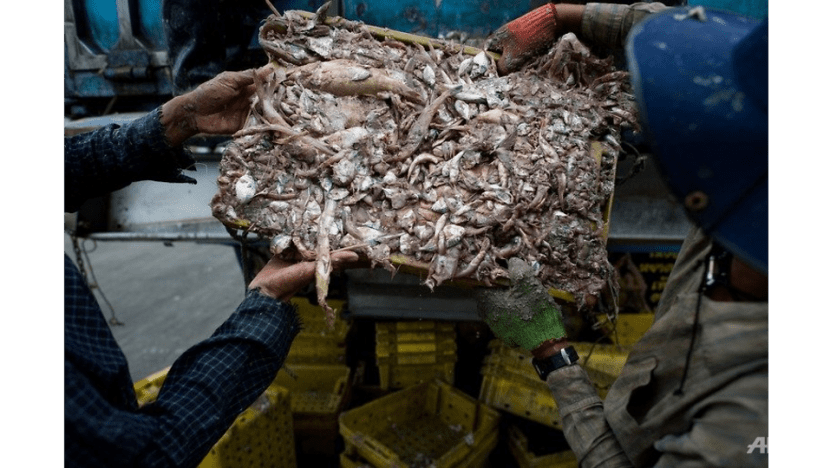‘A new era of slaves’: Thailand’s plan to loosen fisheries laws renews fears of illegal fishing, forced labour
Thailand, a major seafood exporter, toughened its fisheries laws in 2015 in response to potential bans. Small-scale fishers want to keep the rules, but larger players complain they’ve made it “impossible” to do business.


This audio is generated by an AI tool.
BANGKOK: Thailand is proposing sweeping changes to fisheries laws that could weaken penalties for illegal fishing and the protection of workers, reversing gains made several years ago and threatening billions of dollars worth of trade, opponents say.
The changes include reduced penalties for illegal, unreported and unregulated (IUU) fishing, the deregulation of destructive fishing gears such as trawling nets, reintroducing the banned practice of transshipment of seafood at sea, and the relaxation of regulations on catching protected marine species.
Jail terms would be eliminated for all IUU offences and some fines could be decreased by 98 per cent. For example, the maximum fine for fishing in a marine protected area could be reduced from approximately US$825,000 currently to just US$13,750.
Labour protections – aimed at ensuring the safety of mostly migrant workers at sea – could also be rolled back.
Some draft bills include re-allowing the transfer of boat crews at sea and removing requirements for vessels to provide crew lists before leaving port. These raise concerns about workers’ welfare and the heightened risk of human trafficking.
The Thai parliament is currently considering the raft of new bills from different political parties in the government and opposition.
While different parties and the national cabinet have proposed different law changes, which are currently being negotiated, they agree that the current legislation is too strict on commercial fishers.
“What every political party has agreed on is about the penalties within the law, which we think are overreaching,” said Mr Woraphop Viriyaroj, a member of parliament representing the Move Forward Party and the deputy chairman of the committee to consider the draft amendments to the Fisheries Act.
“To amend this law doesn’t mean we will cancel everything and change it back to the way it was before," he said.
We are aware that there was a problem then for fisheries and labour, and nobody wants to go back to that point. But right now, the law leaves no flexibility."
YELLOW CARDS AND POLITICAL GAMES
The commercial fishing industry in Thailand has long argued that the existing regulations, imposed in 2015 by the then-military government, are unfair and hurt business operations.

Thailand had toughened regulations in response to being given a “yellow card” by the European Union (EU) in 2015 for failing to take sufficient actions against illegal fishing in its territory. At the time, the country’s seafood exports were at risk of broad bans.
The yellow card acts as a formal warning for countries to improve their practices or risk receiving a red card, which would result in export bans to the EU. Thailand was delisted as a warned country in 2019 due to the progress it had made.
In 2014, the United States Department of State had also slapped Thailand with a Tier 3 ranking in its Trafficking in Persons (TIP) report, the lowest grade possible.
But the National Fisheries Association of Thailand (NFAT), which represents 58 commercial fishing members across 22 provinces, has powerfully lobbied for change.
Its president, Mr Mongkol Sukcharoenkana, told CNA the industry is facing plummeting profits, difficulties in securing labour and overregulation.
“The military interpreted IUU regulations broadly and enforced it in a way that has made it impossible for the fishing industry to do business,” he said.
He was unconcerned about the EU reimposing a yellow card on Thailand, saying exports to that region made up only about 5 per cent of Thailand’s annual total.
“The US and EU should understand that we are making this bill in parliament … and they should support us.”
DRAMATIC U-TURN ON PREVIOUS GOOD WORK, NGO SAYS
But some global seafood brands and non-governmental organisations have written to Prime Minister Srettha Thavisin, concerned that weaker regulations would harm Thailand’s reputation as well as the long-term viability of its fisheries sector.
Mr Dominic Thomson, a deputy director for the Environmental Justice Foundation (EJF) in Southeast Asia, said such drastic changes would inevitably result in important export market partners taking a closer look at Thailand’s seafood industry again.
Analysis by the EJF found that up to 60 per cent of Thailand’s seafood exports worth some US$3.3 billion annually could be at risk of future sanctions, including those to the EU, US, Australia and Japan.
“Why is Thailand taking such an extreme stance on this and making such a dramatic U-turn on its international commitments, and on its previous good work that's actually been done on fisheries reform?” he said.
“Because if they do go the full hog and take away all of these reforms, as they intend to do, then it really does derail the entire process from an environmental perspective, but also on human rights.”
Some reports of exploitation and forced labour in the industry have persisted even after reforms. On average, more than 100 workers die at sea every year.
“Working on boats is a life-risking profession and people who work on boats must be protected by law,” said Ms Patima Tungpuchayakul, co-founder of the Labour Protection Network (LPN), an organisation fighting for migrant worker rights in Thailand.
“I think that the penalties should be higher. It could prevent businessmen from wrongdoing and encourage them to try to operate legally instead of seeing these workers as a new era of slaves,” she said.
Thailand held its general election last year and Mr Thomson says commercial interests supported political parties at the time to secure future help in reforming legislation.
On their part, political parties used the issue as a “vote-winning tactic”, he said. “They could see that commercial fisheries, in terms of a voting base, are very vocal. They’re seemingly very powerful in potential vote-winning provinces.”
There is almost unanimous support for commercial fishers in the parliament, he noted.
In February, Thailand's parliament voted 416-0 to loosen regulations on the fisheries industry at the first reading, and is studying eight approved draft bills to propose a new draft, Reuters reported.
FISHING GROUNDS ON THE REBOUND
Thailand’s fishing industry is long past its glory days. From the 1960s, vast numbers of industrial trawlers began ramping up commercial fishing in Thai waters.
The NFAT argues that changes in 2015 swung the balance too far in favour of small-scale artisanal fisherfolk, who are able to fish closer to shore, while trawler activities have been heavily restricted and monitored, due to their environmental impact.

The laws have made it much more difficult for commercial fishers to enter inshore exclusion and marine protected areas, which are important as fish nurseries and for the regeneration of fish populations.
Yet while the association maintains that fishing yields have dropped and seafood prices have sunk, EJF’s analysis has found the opposite to be true.
The EJF found, based on available catch data by tonnage and value from the Department of Fisheries, that for almost all species groupings, the value of seafood landed by Thai-flagged vessels has gone up by 48 per cent, on average, between 2014 and 2022.
Crucial fishing grounds have also started to see a small but gradual rebound in stocks.
By 2017, catches in the Andaman Sea and Gulf of Thailand had reached a low after decades of overfishing.
Catch per unit effort (CPUE), which is a measure of how healthy fish stocks are and measured in kilograms of fish caught per hour, dropped by 96 per cent in the Gulf and 86 per cent in the Andaman between 1961 and 2017, based on data from the Department of Fisheries.
As of 2022, the figure in each water body had recovered by 80 per cent and 40 per cent, respectively.
It is “too soon” to think about rolling back any of the conservation measures, which have the “knock-on effect” of improving the productivity of inshore exclusion zones and the catches of artisanal fishers, said Mr Thomson.
Last month, 18 artisanal fishing associations presented their concerns to the Thai parliament, namely that commercial vessels would once again be allowed to encroach on their protected fishing grounds.
Yet these groups remain underrepresented in the law drafting committee, while there is no representation from environmental or labour groups.
WEAKENING WORKERS’ PROTECTION “A SLIPPERY SLOPE”
While the Thai fishing industry remains a dangerous business, labour and human rights groups say conditions have improved markedly in recent years, with operators made to properly register and compensate their workers.
“The situation on boats is better, workers are legal and they feel like they exist and are protected,” Ms Patima said.
Now, five of the eight proposed bills support the re-authorisation of at-sea crew transfers, as well as dropping crew-list requirements, which in the past has led to human rights abuses that are difficult to detect.
Move Forward Party is alone in wanting to drop the requirement for migrant workers to carry a seaman book, a document that licences their work on vessels.
The NFAT says the process of hiring and keeping crew is overly cumbersome and expensive, and there should be a decoupling of labour regulations from the law on fisheries.
“I think we need to separate the regulations because IUU is about how we manage the ships and protect the environment, but labour is totally another issue,” Mr Mongkol said.
Mr Woraphop agrees, saying the country’s current labour laws adequately cover fishing issues already.
But eroding workers’ protection is a “slippery slope”, said Mr Thomson.
If you are starting to chip away at some of these transparency mechanisms that were designed to stop murder at sea and slavery at sea, then it makes the fisheries more at risk of labour abuses and labour exploitation."
The EJF and a network of other organisations are calling for the government to invest more in worker training and welfare to make the industry more attractive and less “infamous” to overseas communities in Myanmar, Cambodia and Laos, who typically are employed in the sector.
The legislation will need to be finalised and pass through both houses of parliament, a process that could take several months.


















